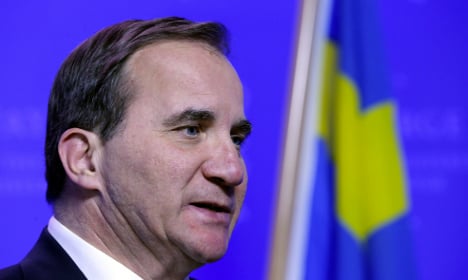POLITICS
Support cools for Sweden’s new coalition
Pollsters have found that Swedes are becoming less happy with the new Red-Green coalition government and more keen on the country's centre-right parties, with the gap between the two blocs decreasing.
Published: 13 November 2014 12:24 CET
Updated: 13 November 2014 14:24 CET
Updated: 13 November 2014 14:24 CET

Social Democrat leader Stefan Löfven leads the current government. Photo: TT
Polling firm Novus revealed on Thursday that the centre-right Moderate party – which led the previous centre-right coalition – is now 2.5 percentage points more popular than it was in September's elections.
The governing Social Democrats have meanwhile seen a drop of 2.4 percentage points since the election. The study suggests that 28.6 percent of voters would chose them today.
The change means that the gap between the two main politicial blocs in Sweden has shrunk to less than one percentage point.
The Red-Greens have 42.8 percent support compared to 42.1 percent for the four Alliance parties in opposition.
If the opinion poll results reflected a fresh election, the nationalist Sweden Democrats would retain their kingmaker role as the country's third largest party.
The party's support saw a slight drop from 12.9 percent in the elections to 12.3 percent in September, according to the poll.
The remaining parties saw little to no change in support, with the exception of the Centre Party – which saw a 1.4 percentage point growth to 7.1 percent and the Feminist Initiative which has lost supporters since the general election.
Social Democrat leader Stefan Löfven took questions from other party leaders in parliament on Thursday afternoon.
He was quizzed about the possible closure of Stockholm's Bromma airport and said that a final decision had not been taken.
Reacting to a question about one local authority – Kronobergs – which has been debating whether or not doctors should have the right to refuse abortions on moral grounds, he said:
"I see troubles if you start moving discussions in this direction".
Url copied to clipboard!



 Please whitelist us to continue reading.
Please whitelist us to continue reading.
Member comments